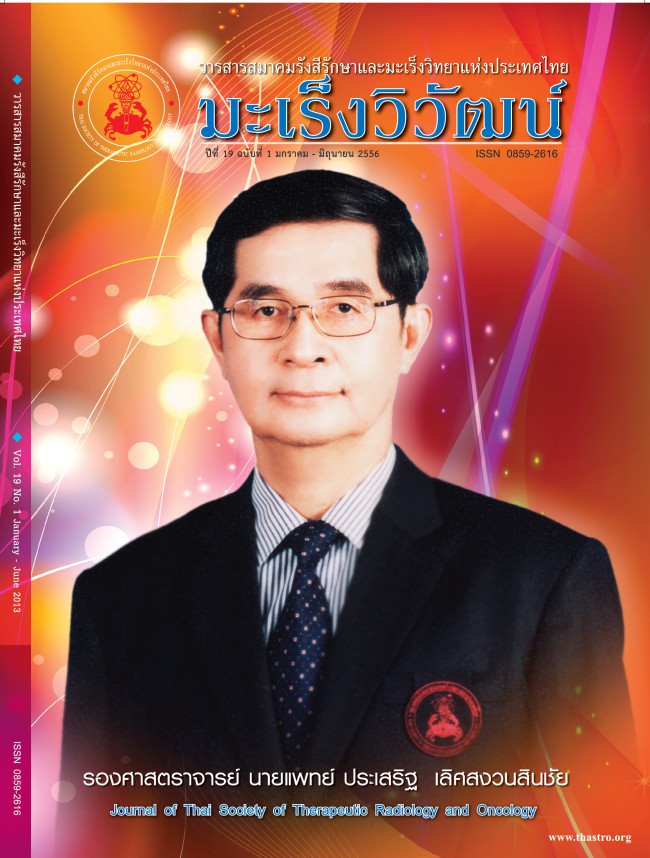FACTORS PREDICTING BOWEL FUNCTION RECOVERY IN PATIENTS AFTER OPEN COLORECTAL RESECTION SURGERY
Keywords:
bowel function recovery, open colorectal resection surgeryAbstract
Objective: To study factors predicting bowel function recovery in patients after open colorectal resection surgery. Methods: This study is a descriptive research design. The sample group consisted of 104 patients who were operated with open colorectal resection technique at 4 tertiary hospitals in Bangkok, Thailand, from May to December 2012. The data were collected by using the demographic data form, the first feeding and ambulatory record form, the State Anxiety Inventory, and the bowel function recovery score. Descriptive statistics, Pearson’s Product Moment Correlation, and Hierarchical regression were utilized for data analysis. Results: The results of the study showed that preoperative serum albumin and anesthetic technique had positive relationship with bowel function recovery (r = .407 and r = .556, p < .01). Age and operative time had negative relationship with bowel function recovery (r = -.535 and r = -.592, p < .01). In addition, the time for beginning oral diet and first ambulation after operation had a significant and negative relationship with bowel function recovery (r = -.215 and r = -.230, p < .05), whereas preoperative anxiety was not related with bowel function recovery (r = .072, p > .05). Finally, operative time, age, time for beginning oral diet, anesthetic technique, time for first ambulation, and preoperative serum albumin could predict bowel function recovery in patients after open colorectal resection surgery, accounting for 58% of the variance (R2 = .580, p < .01). Conclusion: The data of age, preoperative serum albumin, anesthetic technique, and duration of operation can be used as a basic data for patient care. Particularly, the early postoperative oral feeding and ambulation can promote the recovery of bowel function.
References
Behm B, Stollman N. Postoperative ileus: etiologies and interventions. Clin Gastroenterol Hepatol. 2003;1:71-80.
Holte K, Kehlet H. Postoperative ileus: a preventable event. Br J Surg. 2000; 87:1480-1493.
ณัฐพล สันตระกูล. How to prevent and management of postoperative ileus. ใน: พรพรหม เมืองแมน, ณัฐพล สันตระกูล, ประยุทธ ศิริวงษ์, เพชร เกษตรสุวรรณ, บรรณาธิการ. Current problems in surgery ศัลยศาสตร์ทั่วไป เล่ม 7. กรุงเทพฯ: โฆษิตการพิมพ์ จำกัด; 2551. หน้า 129-144.
สุทธิชัย จิตะพันธ์กุล. หลักสำคัญของเวชศาสตร์ผู้สูงอายุ. พิมพ์ครั้งที่ 3. กรุงเทพฯ: สาขาวิชาเวชศาสตร์ผู้สูงอายุ ภาควิชาอายุรศาสตร์ คณะแพทย์ศาสตร์ จุฬาลงกรณ์มหาวิทยาลัย; 2544. หน้า 82-89.
Lohsiriwat V, Chinswangwatanakul V, Losiriwat S, Akaraviputh T, Boonnuch W, Methasade A, et al. Hypoalbuminemia is a predictor of delayed postoperative bowel function and poor surgical outcomes in right-side colon cancer patients. Asia Pac J Clin Nutr. 2007; 16:213-217.
กษยา ตันติผลาชีวะ. Postoperative ileus: Cause, prevention and treatment. ใน: ประยุทธ์ ศิริวงษ์, สมบุญ เจริญเศรษฐมห, ปริญญา ทวีชัยการ, บรรณาธิการ. ศัลยศาสตร์วิวัฒน์ 32 current practice in colorectal surgery. กรุงเทพฯ: กรุงเทพเวชสาร; 2549. หน้า 83-110.
Stevens RA, Mikat-Strvens M, Flanigan R, Waters WB, Furry P, Sheikh T, et al. Dose the choice of anesthetic technique affect the recovery of bowel function after radical prostectomy? Urology. 1998; 52:213-218.
Hollenbeck BK, Miller DC, Taub D, Dunn RL, Khuri SF, Henderson WG, et al. Identifying risk factors for potentially avoidable complications following radical cystectomy. J Urol. 2005;174:1231-7
ชัยวัฒน์ ต่อสกุลแก้ว. สรีรวิทยาทางเดินอาหาร. พิมพ์ครั้งที่ 2. กรุงเทพฯ: เท็กซ์ แอนด์ เจอร์นัล พับลิเคชั่น จำกัด; 2542.
Ay AA, Kutun S, Ulucanlar H, Tarcan O, Demir A, Cetin A. Risk factors for postoperative ileus. J Korean Surg Soc. 2011; 81:242-249.
Svatek RS, Fisher MB, Williams MB, Matin SF, Kamat AM, Grossman HB, et al. Age and body mass index are independent risk factors for the development of postoperative paralytic ileus after radical cystectomy. Urology. 2010;76:1419-24.
กฤษณมล วิจิตร, จิราพร เกศพิชญวัฒนา. การพยาบาลผู้สูงอายุที่ได้รับการผ่าตัด. วพวส.2546; 4:22-37.
El Nakeeb A, Fikry A, El Metwally T, Fouda E, Youssef M, Ghazy H, et al. Early oral feeding in patients undergoing elective colonic anastomosis. Int J Surg. 2009;7:206-9.
Waldhausen JH, Schirmer BD. The effect of ambulation on recovery from postoperative ileus. Ann Surg. 1990; 212:671-677.
Lohsiriwat V, Losiriwat D, Boonnuch W, Chinswangwatanakul V, Akaraviputh T, Lert-akayamanee N. Pre-operative hypoalbuminemia is a major risk factor for postoperative complications following rectal cancer surgery. World J Gastroenterol. 2008; 14:1248-1251.
Wattanawech T. The influence of selected factors and self-care behavior on abdominal distention in patient with abdominal surgery. Master of nursing science Thesis in adult nursing Graduate school Mahidol University, Bangkok, Thailand; 2002.
Johnston M. Anxiety in surgical patients. Psychological Medicine. 1980; 10:145-152.
Downloads
Published
How to Cite
Issue
Section
License
บทความที่ได้รับการตีพิมพ์เป็นลิขสิทธิ์ของวารสารมะเร็งวิวัฒน์ ข้อความที่ปรากฏในบทความแต่ละเรื่องในวารสารวิชาการเล่มนี้เป็นความคิดเห็นส่วนตัวของผู้เขียนแต่ละท่านไม่เกี่ยวข้องกับ และบุคคลากรท่านอื่น ๆ ใน สมาคมฯ แต่อย่างใด ความรับผิดชอบองค์ประกอบทั้งหมดของบทความแต่ละเรื่องเป็นของผู้เขียนแต่ละท่าน หากมีความผิดพลาดใดๆ ผู้เขียนแต่ละท่านจะรับผิดชอบบทความของตนเองแต่ผู้เดียว




